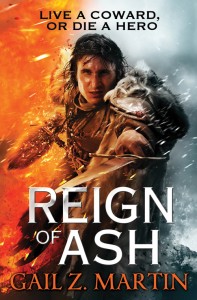The Politics of Chaos

Nature abhors a vacuum—nowhere more so than in politics. Remove a dictator, and a hundred evil wanna-be despots arise in his stead. Depose a king, and the nobles squabble among themselves. Take down a tyrant, and the underlings kill each other off until only one remains.
In my first Ascendant Kingdoms novel, ICE FORGED (US | UK | AUS), the war between Donderath and neighboring Meroven got out of hand after years of ground assaults, leading to devastating strikes and counter-strikes by the mages on both sides. The strikes were intended to kill the king and the families of the nobility, which they did. But the strikes also severed the bond that enabled mortals to control magic, making it a wild force of nature. The civilizations of Donderath and Meroven, which had depended upon magic, collapse. Leaderless, with the magic gone and the infrastructure in ruins, Donderath and Meroven descend into chaos.
Unfortunately, anarchy has its advocates.
One of the aspects that intrigues me with the Ascendant Kingdoms books is the tension between order and chaos. On the plus side, chaos can permit natural talent to rise, unencumbered by inherited position, social convention or historical precedent. More often, this means that might makes right, the strong oppress the weak and justice fails.
Among those who see opportunity in chaos and anarchy are men who have styled themselves as warlords, mustering Donderath’s defeated returning soldiers to their ranks and gathering the displaced farmers and tradesmen who have nowhere else to go. Bandit gangs and highwaymen prowl the byways and the city streets now that the king’s guards are no longer to be feared. The talishte—vampires—are split between those who see an opportunity to take the power for themselves as the strongest predators and subjugate mortals, and those who prefer the rule of law. Mages also split between those who desire to use their power to rule over the non-mages by magical force, and those who prefer to work in service to governing powers.
Between the warring factions are the farmers, tradespeople, soldiers and townsfolk whose entire existence was upended by the war and the Cataclysm that resulted from the mage strikes. Unlike the court mages and the battle wizards who worked magic on a grand scale, the common people relied on small magic to make their lives easier in hundreds of ways. Before the Great Fire, magic kept milk from souring and healed sick children and lamed horses. Magic shored up wobbly walls and kept fences together and kept the river from flooding its banks. The Great Fire burned their towns and destroyed their leadership. They lost their livelihoods and crops to fire and flood, along with losing their livestock to illness and their sons to the war. Some try to make the best of it and get on with their lives. Others choose sides, pledging themselves to the service of one of the new warlords.
Blaine McFadden was willing to be stripped of his lands and title to save his sister from dishonor, and the murder he committed resulted in his exile. When he discovers that he is the only living Lord of the Blood and returns to restore the magic, he finds that creating some degree of order is necessary to enable the lands to rebuild. The title he never coveted is now his, along with the responsibilities. And it is increasingly clear that he’s going to have to win a new title—that of ‘warlord’—in order to live long enough to accomplish his goal and protect everything he holds dear.
…
REIGN OF ASH (US | UK | AUS), book two of the Ascendant Kingdom Saga, releases today! Read an excerpt now or start from the beginning with ICE FORGED.

